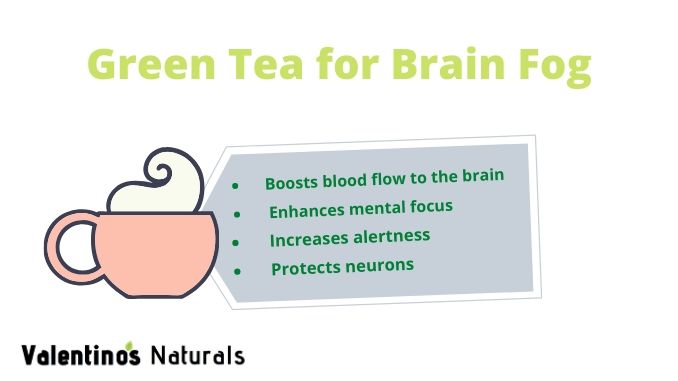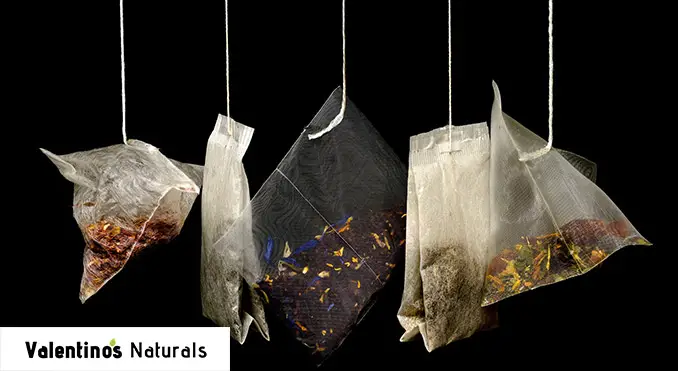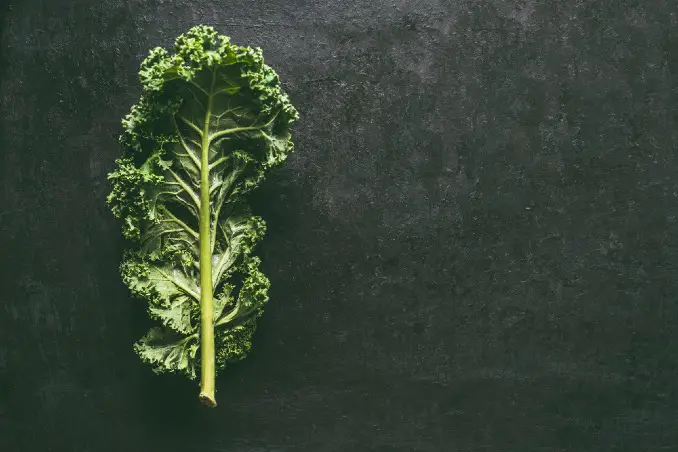The best tea for brain fog is green tea. It contains potent antioxidants that have the ability to boost blood flow to your brain and protect from free radicals.
In addition, green tea has a small molecule called L-theanine, which is known for its ability to enhance focus.
When people say the word ‘brain fog,’ they talk about a blanket term for a number of symptoms.
These include lack of focus, inability to think clearly, confusion, mental fatigue, or slow mental processing. In any case, it’s an annoying and unwanted side effect of our fast-paced lifestyles.
So what is the Best tea for brain fog?
As it turns out though, once you can recognize the symptoms of brain fog and learn a little about what’s causing it. You can develop a strategy to erase brain fog from your life.
In this post, we’ll dive into symptoms and causes of brain fog. Along with explaining how beverages like green tea can be a part of your strategy for eliminating it once and for all.

Related: 5 Surprising Brain Benefits of Sage
Brain Fog Symptoms
Typical symptoms of brain fog include:
- Lack of focus
- Mental Fatigue
- Forgetfulness
- Difficulty concentrating and communicating
- Confusion
- Cloudy thinking
Possible Causes of Brain Fog
Sleep disorders, nutrient deficiency, a thyroid condition, depression, or bacterial overgrowth due to an unhealthy diet can all be causing brain fog, according to Parsleyhealth.
Other common causes of brain fog are:
- Eating too often (and too much)
- Not sleeping well
- Chronic stress (a big one!)
Hormonal imbalance
A hormonal imbalance happens when your body starts producing too little or too much of a certain hormone. That’s a common cause of brain fog. Most often, brain fog occurs when thyroid hormones go out of balance.
This happens when a person has an autoimmune disease where immune cells attack their own thyroid – creating an inflammatory state. Adrenal fatigue from chronic stress can also lead to brain fog, due to an imbalance in blood sugar levels.
Poor Sleep
Bad sleep hygiene, such as getting less than 7 hours of sleep per night, digital screen exposure before bed, and irregular sleep and wake times can all disrupt your internal clock, aka your circadian rhythm.
This contributes to brain fog in a number of ways.
For example, blue wavelengths from digital screens decrease melatonin, a hormone that’s critical for deep sleep. Your brain and body detoxify the most between the hours of 10 PM and 2 AM.
Disrupting this natural process can contribute to mental fogginess.
Related: Does Honey Help You Sleep? (The Truth)
Diet for Best tea for brain fog
Vitamin B12 is important for forming red blood cells and for regulating nerve functions. As a nootropic, vitamin B12 is essential for mental energy – deficiency in this nutrient can often lead to brain fog.
Vitamin D is another nutrient that is important for brain function, however, many people are deficient due to a lack of sun exposure. Intolerance to certain foods can also cause brain fog.
For example, gluten intolerance is best known for causing cognitive issues via inflammatory pathways in the body. Making sure you eat a clean diet, and perhaps even testing for food intolerances can help you have a healthier, clearer mind.
Best Tea for Brain Fog Final Words

As we’ve seen, the best tea for brain fog and the healthiest ‘brain tea’ in general, is unquestionably green tea. To quote a study review (2):
“The reviewed studies presented evidence that green tea influences psychopathological symptoms (e.g. reduction of anxiety), cognition (e.g. benefits in memory and attention) and brain function (e.g. activation of working memory seen in functional MRI).”
Tea has caffeine like coffee, but the effects it gives are way different. How so? Because green tea also has something called L-Theanine which promotes the relaxed focus.
Green, Purple, and White Tea also contain powerful antioxidants such as EGCG. These are small molecules that can penetrate through your blood-brain barrier, protect neurons, and boost mental clarity.
In research, green tea has been shown to increase alpha brain waves, which are seen in experienced meditators. Green tea also boosts something called GABA – a brain chemical that puts you in a positive headspace. (1)
Further Reading: Which Dry Fruit is Good for the Brain?
Best tea for brain fog References
- L-theanine, a natural constituent in tea, and its effect on mental state. (source)
- Green tea effects on cognition, mood and human brain function: A systematic review. (source)



